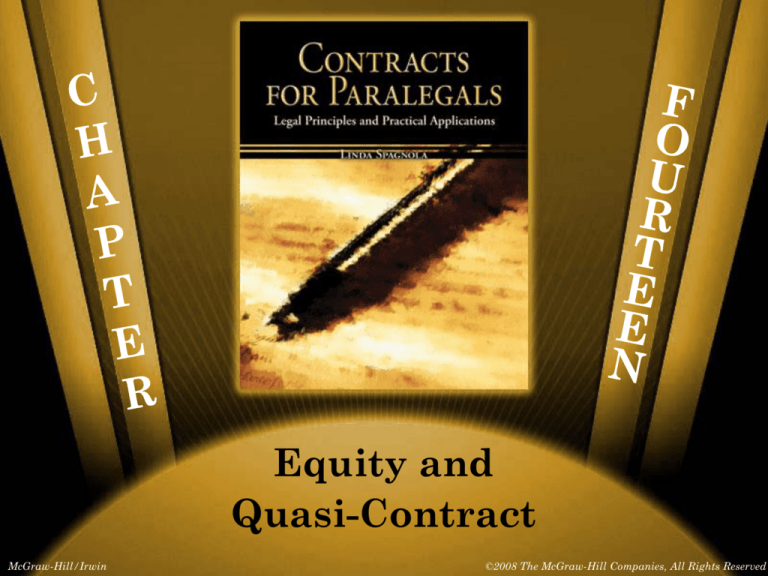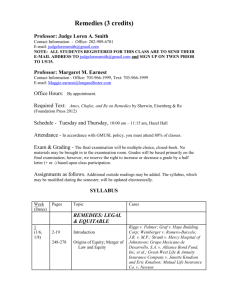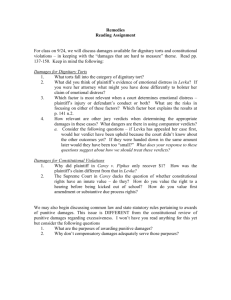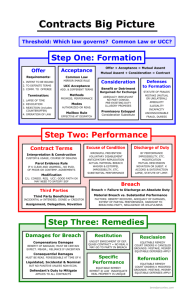
Equity and
Quasi-Contract
McGraw-Hill/Irwin
©2008 The McGraw-Hill Companies, All Rights Reserved
Objectives
Chapter Objectives:
• Use vocabulary regarding equitable remedies
properly
• Differentiate among the different types of
equitable remedies and explain the basis for
their award
• Evaluate the plaintiff’s chances for success in
obtaining the different kinds of injunctive
relief
• Identify situations where the court will or will
not order specific performance
14-2
Objectives
Chapter Objectives:
• Discuss the doctrine of promissory estoppel
• Determine if/when a defendant has been
“unjustly enriched”
• Explain the difference between a valuation of
equitable damages based on quantum meruit
and quantum valebant
• Discuss the doctrine of “unclean hands”
14-3
Objectives
• This chapter will examine WHAT HAPPENS
when contractual remedies are not available
to a plaintiff DUE TO a defect in the
formation or substance of the agreement, and
• WHY these kinds of damages are made
available
14-4
Definitions
• Equity
– The doctrine of fairness and justice; the process of
making things balance or be equal between
parties
• Bright line rules
– A legal standard resolves issues in a simple,
formulaic manner that is easy in application
although it may not always be equitable
• Black letter law
– The strict meaning of the law as it is written
without concern or interpretation of the reasoning
behind its creation
14-5
“Action” Damages
• When a party’s monetary damages are
inadequate to compensate for the harm
incurred, the court has the ability to order
alternative equitable remedies in the form
of either
1. an injunction or
2. specific performance
• These are “action” damages because they
effectively force the defendant to act in
some way to try to remedy the breach
14-6
“Action” Damages
It bears repeating that the court must find
that monetary remedies are insufficient to
compensate the plaintiff.
Only after showing that the money will not
fix or prevent harm can the plaintiff obtain
an injunction or specific performance.
14-7
14-8
“Action” Damages
• Injunction
– A court order that requires a party to
refrain from acting in a certain way to
prevent harm to the requesting party
“Action” Damages
• Temporary injunction
– A court order that prohibits a party from
acting in a certain way for a limited
period of time
• Permanent injunction
– A court order that prohibits a party from
acting in a certain way for an indefinite
and perpetual period of time
14-9
“Action” Damages
• Preliminary hearing
– An appearance by both parties before the
court to assess the circumstances and
validity of the restraining application
14-10
“Action” Damages
• Specific Performance
– A court order that requires a party to
perform a certain act in order to prevent
harm to the requesting party
– To obtain an order for specific performance,
the contract must be very clear as to the act
to be compelled. The standard of proof for
specific performance is greater than that of
obtaining damages at law
14-11
“Court-Ordered” Solutions
• Declaratory Judgment
– the court’s determination of the rights and
responsibilities of a party with respect to
the subject matter of the controversy
• The court’s decree settles the matter in its
entirety
14-12
“Court-Ordered” Solutions
It is important to note that declaratory
judgment is only appropriate where
another legal remedy is not available.
The action for declaratory judgment is
limited to situations where there is
genuine controversy as to the rights and
status of the parties involved and a
declaration of those rights as determined
by the court will resolve the issue
between the parties.
14-13
“Court-Ordered” Solutions
• Rescission and restitution
– A decision by the court that renders the
contract null and void and requires the
parties to return to the wronged party any
benefits received under the agreement
14-14
“Court-Ordered” Solutions
• Reformation
– An order of the court that “rewrites” the
agreement to reflect the actual
performances of the parties where there
has been some deviation from the
contractual obligations
14-15
Quasi-Contracts
• Quasi-contract / pseudo-contract / implied-inlaw contract
– Where no technical contract exists, the
court can create an obligation in the name
of justice to promote fairness and afford a
remedy to an innocent party and prevent
unearned benefits to be conferred on the
other party
14-16
Quasi-Contracts
• Promissory estoppel does not require
certainty in all the elements of contract
• This theory of relief only arises where there is
no valid contract!
• Where a defect in formation would normally
render the contract unenforceable under
traditional contract principles, the court can
look to the precepts of fairness and rely on
the doctrine of promissory estoppel
14-17
Quasi-Contracts
• Promissory reliance
– A party’s dependence and actions taken
upon another’s representations that he
will carry out his promise
• Substantial detriment
– The change in a party’s position in reliance
upon another’s representations that, if
unanswered, will work a hardship on that
party
14-18
Quasi-Contracts
•
•
Prevention of Unjust Enrichment
– the doctrine of unjust enrichment focuses
on the unearned benefit received by the
promisor
The court must find that:
1. there was a promise made
2. that the promisor intended to induce the
promisee to act in reliance thereon, and
3. the promisee’s actions conferred a benefit
on the promisor
14-19
Quasi-Contracts
• Quantum meruit
– A Latin term referring to the
determination of the earned value of
services provided by a party
– Quantum meruit is the value of services
rendered
14-20
Quasi-Contracts
• Quantum valebant
– A Latin term referring to the
determination of the market worth
assignable to the benefit conferred
– The court may determine that a more just
valuation lies in quantum valebant, which
is the value of the benefit received
– This is the value to the benefited promisor.
It is the amount of money the promisor has
gained in taking advantage of the situation
14-21
Doctrine of “Unclean Hands”
None of these equitable remedies will be
available to a party seeking relief if
they come to the court with unclean
hands. Where the plaintiff is also
guilty of some misconduct, the notions
of justice under equitable principles
will not allow a guilty party to
complain of unfairness.
14-22
Summary
• Equitable principles allow a court to grant a
remedy where justice requires but where
contract law does not recognize a legal,
monetary remedy
• Where money does not adequately compensate
an aggrieved party for the damages caused by
a breach, a court may order the breaching
party to act or refrain from acting in some way
that will make up for the loss
14-23
Summary
• The court also may fashion a remedy in the
form of
1. Declaratory judgments: the court makes a
determination of the rights and responsibilities of the parties with respect to the
subject matter
2. Rescission and restitution: the court
declares the contract null and void and
gives the plaintiff damages to make
him/her whole again
3. Reformation: the court changes the
document to reflect the actual
understanding of the parties
14-24
Summary
• The doctrine of promissory estoppel where
1. A promise is relied upon by the aggrieved
party, and
2. The promisor knows the promisee will
reasonably rely upon it, and
3. The promisee incurs a substantial
detriment as a result of the reliance
14-25
Summary
•
Courts determine the value of the promise
under either promissory estoppel or unjust
enrichment doctrines
•
A calculation can be made using either
quantum meruit or quantum valebant
•
None of these equitable principles applies if
the aggrieved party comes to the court with
unclean hands
14-26








